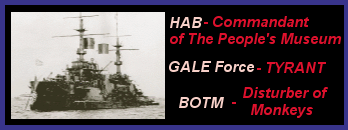Knife wrote:I was not aware that modern day archaelolgical excavations used strip minning techniques. I guess if you dug up the entire site, and have taken everything at the site, then yes. But I was not aware that the archeologists have gotten everything in ancient Pershia and Babylon.
They haven't. Just the most important places, which means that the likelihood of discovering new very significant finds is substantially smaller now that the most important things are gone.
Knife wrote:Everything they do dig up is important on one level or another, but lets face it, while the ancients only made so many stone tablets with the wisdom of the time, they also made a shit load of bowls and cups to eat and drink out of. If perhaps the looters have taken and/or destroyed an ancient text or irreplaceable tablet containing something that is not found any where else, you will have won me over and I will conceed to your points. But a bowl or pot or cup, while in itself important to determine the lifestyles and other social aspects of ancient life, is one of many that are possiblly under a given archaelolgical site.
I just today finished a book on how our alphabet evolved from Egyptian hieroglyphs and how it compared to other writing systems of the time, and it of necessity deals fairly extensively with archaelogy as a tool of tracing how that process occurred. Pottery shards have been one of the most important staples in that respect, since broken pots were good for nothing, relatively speaking, so shards were used to write messages on and then discarded when no longer necessary. If not for that, we'd have a lot less information on how it happened.
As for site looting, there is a good section in the book on how they discovered a completely untouched site in Egypt just outside a major city that contained the earliest known traces of non-hieroglyphical alphabetic writing as well as other important stuff. After reporting it and applying for the permits to dig it up, work began, but the site itself was destroyed by looters in just a couple of years. Most of what is preserved has been in photographs, luckily, so not everything is gone, but a lot is. A pot, in and of itself, is not necessarily worth much, it's what else can be gleaned from it (if it's painted, has writing, or whatever else).
If anybody is interested in that alphabet history book, it's
Alpha Beta: How Our Writing Influenced the Western World by John Man, published in 2000 by Headline Book Publishing. It's not difficult or deep reading, but it has a shitload of info in it and gives a rather unique perspective into the history of Egypt, the Middle East and Mediterranean Europe, as well as to some parts of Korean and Chinese history.
Edi



